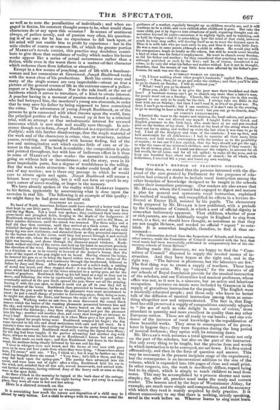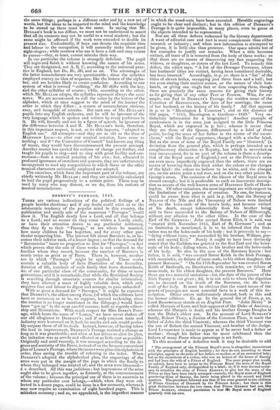WILHEM'S METHOD OF TEACHING SINGING.
Some time since, we stated that the persons intrusted with the dis- posal of the sum granted by Parliament for the purposes of edu- cation had evinced a desire to include vocal instruction among the other branches of knowledge designed to be taught in the schools under their immediate patronage. .Our readers are also aware that Mr. HUELAH, whom the Council had engaged to digest and mature a plan for general and systematic vocal instruction; explained his method of teaching, and exemplified its effects in a lecture de- livered at Exeter Hall, assisted by his pupils. The elementary work prepared by Mr. Human is now published, with a prelude by the Committee of Council, in which a sort of official dignity is somewhat ludicrously apparent. That children, whether of poor or rich parents, are not habitually taught in England to sing from notes, is a fact, we should have thought, as notorious as that they are not taught Hebrew, and needed no official " report " to esta- blish. It is somewhat laughable, therefore, to find it thus an- nounced— " The information derived from the Inspectors of Schools, and from various other sources, made the Committee of Council acquainted with the fact, that vocal music had been successfully cultivated in comparatively few of the ele- mentary schools of Great Britain,.
Having made this discovery, we are happy to find the " Com- mittee of Council" disposed to supply the needed means of in- struction. And they have begun at the right end, and in the right way. "The harvest is plenteous, but the labourers are few." The first thing was to create a supply of teachers. These have long ceased to exist. We say " ceased," for the statutes of all our schools of Royal foundation provide for the musical instruction of the scholars, and our Universities had musical professors, whose office was not, as it now is, a sinecure, but an active and laborious occupation. Lectures on music were included by GRESHAM in the supply of gratuitous instruction for the people. The English were a musically-educated people ; and those only who know no better talk of the diffusion of musical instruction among them as some- thing altogether new and unprecedented. The fact is, that Eng- land has still preserved a supply of compositions eminently adapted to " the use of such as take delight in music of voices," more abundant in quantity and more excellent in quality than any other European nation. These are all ready to our hands ; and one evi- dence of the increase of vocal knowledge is the republication of these beautiful works. They arose in consequence of its preva- lence in bygone days ; they were forgotten during the long period of musical darkness ; they uprise with its returning dawn.
Mr. HULLAH'S work assumes a total ignorance of music not only on the part of the scholars, but also on the part of the instructer. Not only every thing to be taught, but the precise form and words in which instruction is to be conveyed, are set down. It is first stated affirmatively, and then in the form of question and answer. This may be necessary in the present incipient stage of the experiment ; but the consequence is an inconvenient addition to the size of the volume, which is expanded into 160 pages of close and small print. In other respects, too the work is needlessly diffuse, regard being had to its object, which is simply to teach children to read from notes. This may be accomplished by a process shorter and more simple ; for, after all, practice must make the ready and correct reader. The lessons used by the boys of Westminster Abbey, for example, are much more simple and compendious, and the accuracy with which they read is mainly acquired by daily practice. It is almost unnecessary to say that there is nothing, strictly speaking, novel in the work before us. Whoever learns to sing must learn
the same things ; perhaps in a different order and by a new set of
words, but the ideas to be imparted to the mind and the knowledge to be stored up there must be the same. In saying that Mr.
Human's book is too diffuse, we must not be understood to assert that all its contents may not be useful to a vocal student; but the same might be affirmed if the work were extended to double its present size. Undoubtedly, if boys can devote the requisite time and labour to the occupation, it will assuredly make them good eight-singers ; while masters who use it have a safe and easy course to pursue—they, at least, cannot mistake their way. In one particular the volume is strangely deficient. The pupil will begin and finish it without knowing the names of his notes.
They are designated, not A, B, C, according to the universal prac-
tice in England, but Do, Re, Mi, and so- on. The advantages of the latter nomenclature are very questionable ; since the syllables
employed convey no idea of sequence, like the letters of the alpha-
bet, and are besides likely to create confusion. According to one system of what is termed " solfaing," the Mi shifts with the key,
and the other syllables of course ; while, according to the other,
which Mr. HULLAH adopts, the syllables represent always the same notes. We are accustomed to call the notes by the letters of the
alphabet, which at once suggest to the mind of the learner the
order in which they follow ; a system of nomenclature obvious, easy, and incapable of mistake. But turn one of Mr. Hoza.an's
pupils into any English orchestra, and he will be ignorant of the
very language which is spoken and written by every performer in it. He will, literally and not by a figure of speech, be ignorant of the difference between A and B. Mr. HULLAH'S book, therefore, in this important respect, is not, as its title imports, "adapted to English use." All attempts—and they are as old as the time of MATTHEW Locx—to alter our musical notation, have come to nothing : and if " the Committee of Council" had known any thing of music, they would have discountenanced the present attempt. Another master has carried his notions of change yet further, and taught his pupils to sing—and to sing with great facility and cor- rectness—from a musical notation of his own ; but, educated in profound ignorance of crotchets and quavers, they are unfortunately incompetent to read any compositions in which these or the other musical characters universally employed are adopted. The exercises, which form the important part of the volume, are chiefly written by Mr. HULLAH ; and they are admirably calculated to lead the pupil progressively to a certain point. These may be used by many who may dissent, as we do, from his notions of musical nomenclature.



























 Previous page
Previous page